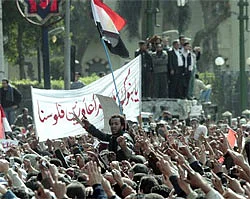

Hundreds of thousands of Egyptians marched peacefully in Cairo on Friday to demand an immediate end to President Hosni Mubarak’s 30-year rule, but there was no word of his generals, or his US allies, squeezing him out just yet.
Hoping for a million-strong turnout nationwide to mark what they called “Departure Day”, men and women from across Egyptian society streamed past patient soldiers to join a crowd estimated at about 2,00,000 in the capital's Tahrir, or Liberation, Square.
Similar pro-democracy rallies were held in other cities.
“Leave! Leave! Leave!” they chanted after weekly Friday prayers in Cairo. A cleric praised the “revolution of the young” and declared, “We want the head of the regime removed.”
There was a festive, weekend atmosphere as secular, middle-class professionals and pious, generally poorer, members of the mass Islamist movement the Muslim Brotherhood, mingled, sang and chanted under banners and ubiquitous Egyptian flags. Members of the Christian minority were also taking part.
“Game over” said one banner, in English for the benefit of international television channels beaming out live coverage.
The defence minister visited the square, inspecting troops who have promised to protect demonstrators. There was no sign of Mubarak loyalists who attacked protesters on previous days. “The army and people are united!” the crowds chanted. Iran’s supreme leader hailed an “Islamic liberation movement” in Egypt.
US moves
US officials said they were discussing with Egyptians a number of options to begin a handover of power that would keep Egypt stable.
Though President Barack Obama has called publicly only for an immediate start to “transition”, one option, a US official said, was for Mubarak to be replaced right away.
Mubarak hit back, saying he was “fed up” and willing to go but was holding on to prevent a descent into chaos. Ministers in the government he hastily appointed a week ago in response to the protests have kept up that message, appealing over the heads of the marchers to 80 million Egyptians weary of disruption.
Islamists’ role
The long-banned Muslim Brotherhood has sought to allay Western and Israeli concerns about its potential to take power in a free vote.
A day after Vice President Suleiman broke ground by saying the Brotherhood was welcome to join a national dialogue, it said it would not seek the presidency.